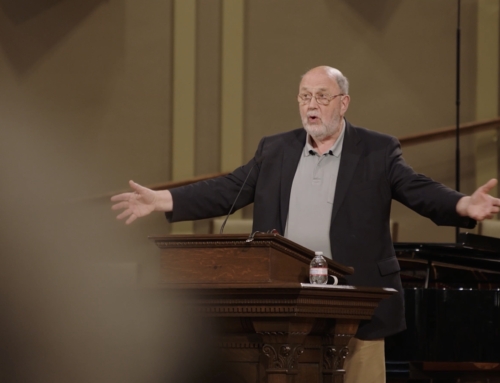You can learn more about how history shapes our faith in Prof. Wright’s newest course, Knowing God in the Created World, on sale now. Enrol HERE.
Are you a history lover? In our family, I would say there’s two camps: my husband, the avid history lover, who prefers books over 500 pages with great explanations of wars, conquests, and political manoeuvres. Then there is me, who picks a fiction novel with a good story over a weighty history tome any day.
It’s possible that, unless you are a keen history buff like my husband, history can feel something best left in the past. Indeed, our present world is filled with enough to wrap our heads around and contend with. However, over time I have discovered that, although not my first choice of reading material, history is indispensable when it comes to reading the Bible wisely. In fact, whilst I would still never call myself a history buff, I would say I have discovered that understanding the history of and within the Bible to be a rich resource and companion for reading the Bible wisely.
Here are three reasons why history matters for reading the Bible wisely.
Asking The Right Questions
Firstly, history helps us ask the right questions when reading the Bible. Context is so important for understanding Scripture. Without it, it’s like picking up a map and trying to navigate without knowing where you are to begin with – you can’t actually get very far, and you certainly won’t get to your destination. History helps us understand the context of what was written, and where, so that we can begin to ask the questions the text was designed to answer.
Currently, I am doing work for my doctoral program looking at the Book of Revelation. Even saying those words, ‘Book of Revelation,’ may make you shudder, or look baffled because so often we try to read it without any of its context. Revelation, like every other book in the Bible, is historically grounded, contextually placed, and orientated towards its first century readers. If I, as a 21st century reader, pick it up and read it with no context, it is easy to feel confused and decide to stop reading it.
Often our lack of historical context has limited our reading of particular texts, including Revelation. The opening verses of Revelation point to its historical locatedness. ‘John, to the seven churches in the province of Asia’ (Rev 1:4). It is written by a particular person – John – to a particular people – the seven churches – at a particular time – in the first century. By looking at Revelation through the lens of critical realism, we can begin to understand the context of the first century and ask appropriate questions of the text.
The tasks of history begin to help uncover the context into which John writes. As Richard Bauckham argues, “If Revelation’s meaning is intertextual, in relation to the Old Testament, then it is also contextual – in relation to the contemporary world.” In my research this dual framework of intertextual and contextual is vital when looking at the symbols used to encode theological meaning. Without the contextual we will likely be unable to wade through the quagmire of symbols that John uses. Sometimes the symbols are explained in the text (e.g. Rev 1:20) but often they reference either the Old Testament or the Greco-Roman world, i.e. the first century world around John. For example, in Revelation 2 John promises to the conquerors at Pergamum a white stone with a new name written on it. Historical inquiry enables us to discover that white stones were used in trials to give a sentencing verdict of innocence saving them from death. So when John promises a white stone to the conquerors the symbol carries with it that meaning from the Greco-Roman world. In other words, if you persevere you will be given a stone that will declare you innocent and be a marker that you were saved from death and bestowed a new name by the Lamb.
One of the prevailing challenges is that we continue to ask the wrong questions and then wonder why we do not get the answers we’re looking for. When it comes to the Bible, too often, as Professor Wright has suggested, we ask 19th century questions of first century texts. We are still influenced by the Enlightenment rationality and the Epicurean vision that dominated such thinking that we allow those questions to become our framing lens for how we examine scripture. We ask questions that the text is not trying to answer. In exploring Genesis, we ask the question How when Genesis is showing Why everything happened. When we get to Revelation, we ask the question When instead of What John is exhorting his readers to do in the here and now. If we instead frame scripture in its first century context, then we begin to ask different questions. We ask questions that concern what people in the first century wrote, believed, and thought.
God Dwelling Among Us
A second reason history matters for reading the Bible is because it is within the pages of the space-time universe that Jesus comes to dwell. Jesus comes down, the incarnate Word into space-time history. If we remove history from our reading of scripture, we miss the significance of God coming to dwell among his people in real time. Throughout history people have tried to abstract Jesus from the events of history, yet we confess a faith in which God came and dwelt within space and time. The New Testament unpacks how God enters into our world and our problems and in Jesus offers a way through. It is only when you look at the history and understand the first century context and world that you really get the message, the Kingdom announcement that Jesus is making. If Jesus is the revelation of God to the world, then we must look to Jesus in order to know God, and that requires us to do the historical work to understand what Jesus meant when he spoke about the Kingdom of God.
An Epistemology of Love
Finally, history enables a new mode of knowing through scripture, what Prof. Wright has called ‘an epistemology of love’. If ‘epistemology of love’ sounds like a tricky phrase to get your head around, think of it as putting yourself in someone else’s historical shoes. It is an act of sympathetic imagination, of love. For a long time within historical study, the quest for knowledge has been focused on rational certainty or an overt scepticism. History, in actual fact, should generate an epistemology of love, which finds new dimensions when the historical events of the Gospels, namely Jesus’s death and resurrection, are brought into view. They evoke a love that is a new dimension to traditional historical epistemology. In other words, as we begin to use history within our reading of the bible, we can discover that as we grow in knowledge it is not a knowledge that is purely theoretical, simply stripping back to exactly what Jesus said and nothing more, but rather offers a way of knowing that is based and grounded in love. History enables a new kind of knowledge in light of the death and resurrection of Jesus, the launching of a new creation which directs and regenerates a knowledge which has love at its heart.
So, while I may not be the kind of person who rushes to pick up a history book, I am a big believer that in order to read the Bible wisely, in order to help it come alive and for it to bring life to us through revealing Jesus, we need to see history as our companion and friend for the journey.
Prof. Wright’s newest course, Knowing God in the Created World, is on sale now! Enrol HERE!
Sarah Millican Jones
Latest posts by Sarah Millican Jones (see all)
- Why History Matters for Reading the Bible Wisely - August 20, 2022







